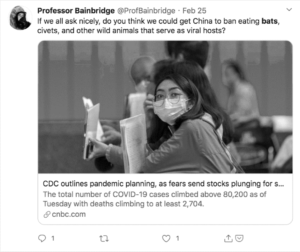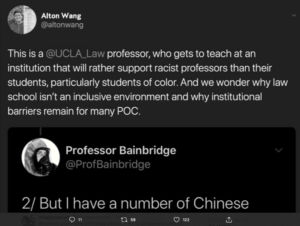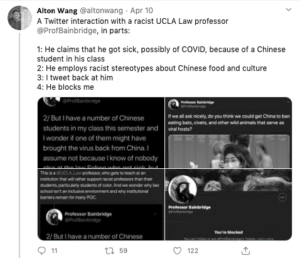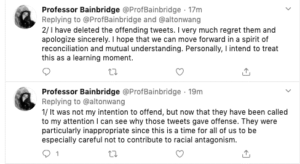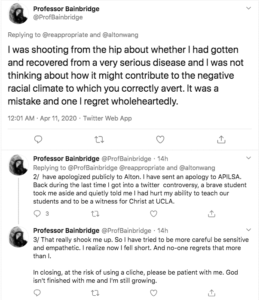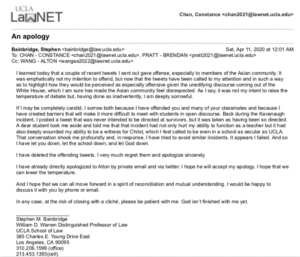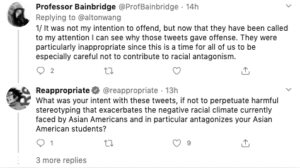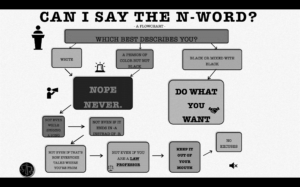The following letter from the UCLA School of Law chapter of the Asian/Pacific Islander Law Students Association was sent to UCLA School of Law administrators on April 13, 2020, in response to anti-Asian statements by a professor. This was not an isolated incidence of hateful language in the UCLA Law community. Earlier in the school year, other UCLA Law professors used the n-word in academic settings with no warning to students. The letter demonstrates the possibilities for and achievements of antiracist student organizing during a pandemic, when students have no access to the buildings and spaces that have traditionally defined their communities. It is part of ongoing organizing work at law schools and other institutions of higher learning across the country aimed at identifying and uprooting individual and institutional racism. UCLA Law Review Discourse has chosen to publish the letter as written; the only changes are the inclusion of a preamble and moving hyperlinks to footnotes.
Preamble
When I first saw Stephen Bainbridge’s Tweets, which were shared by an outraged member of my Asian Pacific Islander Law Students Association (APILSA) board on Instagram, and then reposted by dozens of other students, my mind had been buzzing with concern for family and the Asian-Pacific Islander (API) community at large, who were vulnerable to racist and xenophobic attacks, especially those who are of a vulnerable age or are undocumented. The APILSA community, myself included, was exhausted. We were reconfiguring our lives in the middle of a pandemic. Some of us were struggling with health or family issues, and for those of us who had experienced violent racism in the past, the thought of intervening was retraumatizing. Moreover, we had seen past students appeal to the administration repeatedly regarding professors’ hurtful, racist, and ignorant remarks, but had yet to see any real steps toward accountability.
But my second thought was that we had to respond. Far too few voices, both in the media and in our daily lives, were addressing the rise of anti-Asian sentiment, even as APIs were being spit on, stabbed, and shunned in public. I had seen a few frantic groups pop up on social media where APIs shared thoughts on the increasing violence, but far more people just felt helpless and unsure of what physical defense or legal recourse might be effective. Additionally, we needed to reinforce the unremitting student concern that our school was immunizing legal academia from accountability for racism. It is disorienting to consider the fact that law schools can simultaneously tolerate insensitive faculty remarks and offer courses that denounce the discriminatory nature of the law. Regarding this particular situation, I still find it shocking that some professors feel free to use or tolerate such racist and xenophobic language against APIs when classes at their very institution expose our immigration code’s roots in the Chinese Exclusion Act and condemn Korematsu’s bold generalizations about the threat API-Americans once supposedly posed to national security.
Six APILSA board members and I started writing this letter at midnight, only hours after Bainbridge tweeted. We collectively spent hundreds of hours over the next few days refining our language, seeking a kaleidoscope of input by reaching out to J.D. and LL.M. students, alumni, and faculty, and churning through late-night Zoom calls. Other Asian law student groups reached out in solidarity, some of whom were dealing with similar situations; alumni expressed to us that, when they were students, they too dealt with racist and hurtful remarks from faculty. We doubt this letter is the last of its kind because we know this racist episode is not the last of its kind. In the end, Bainbridge did not commit to sustained, concrete steps towards real accountability. Additionally, we recognize the fact that the UCLA Law administration responded more quickly and fully to these initiatives than it did to those of other students of color in the past, when student activists have been calling for accountability within the law school for a long time. Even then, the administration’s response has not assured us that racist and xenophobic statements by professors at the law school will result in consequences.
If you are also engaged in the intersection between racism, campus leadership, and academia, please know that we feel your exhaustion in the most visceral way—and we see you when you choose to stand up for others.
Constance Chan
APILSA 2019–2020 Co-Chair
Letter
Dear Law School Community,
On Tuesday, February 25, 2020, Stephen Bainbridge issued the following (now-deleted) Tweet:[1]
“If we ask nicely, do you think we can get China to ban eating bats, civets, and other wild animals that serve as viral hosts?”
On Monday, April 6, 2020, Stephen Bainbridge issued the following series of (now-deleted) Tweets:[2]
“1/ The Economist reports that an antibody test for the novel coronavirus will soon be available. I would be most curious to take one. As some of you know, I had a horrific cold/flu in late January/early February that I assumed was a bad case of bronchitis.”
“2/ But I have a number of Chinese students in my class this semester and I wonder if one of them might have brought the virus back from China. I assume not because I know of nobody else at the law Schoo [sic] who got sick, but still . . . One wonders.”
On Thursday, April 9, 2020, Alton Wang, a UCLA Law 1L, Tweeted:[3]
“This is a @UCLA_Law professor, who gets to teach at an institution that will rather support racist professors than the students, particularly students of color. And we wonder why law school isn’t an inclusive environment and why institutional barriers remain for many POC.”
On Friday, April 10, 2020, Stephen Bainbridge blocked Alton Wang on Twitter, and Alton Tweeted about this development with a series of screenshots.[4] Reappropriate, an Asian American media outlet, re-Tweeted Alton’s screenshots and later asked Stephen Bainbridge a question regarding his intentions in posting the Tweets.[5]
On Friday, April 10, 2020, Stephen Bainbridge replied to Alton’s Tweet:[6]
“1/ It was not my intention to offend, but now that they have been called to my attention I can see why those tweets gave offense. They were particularly inappropriate since this is a time for all of us to be especially careful not to contribute to racial antagonism.”
“2/ I have deleted the offending tweets. I very much regret them and apologize sincerely. I hope that we can move forward in a spirit of reconciliation and mutual understanding. Personally I intend to treat this as a learning moment.”
At around midnight on Saturday, April 11, 2020, in response to Reappropriate’s question, Stephen Bainbridge Tweeted:[7]
“I was shooting from the hip about whether I had gotten and recovered from a very serious disease and I was not thinking about how it might contribute to the negative racial climate to which you correctly avert [sic]. It was a mistake and one I regret wholeheartedly.”
“2/ have [sic] apologized publicly to Alton. I have sent an apology to APILSA. Back during the last time I got into a twitter controversy, a brave student took me aside and quietly told me I had hurt my ability to teach our students and to be a witness for Christ at UCLA.”
“3/ That really shook me up. So I have tried to be more careful be [sic] sensitive and empathetic. I realize now I fell short. And no-one regrets that more than I. In closing, at the risk of using a cliche, please be patient with me. God isn’t finished with me and I’m still growing.”
At midnight on Saturday, April 11, 2020, Stephen Bainbridge emailed an apology to Constance Chan and Brendan Pratt, co-chairs of APILSA, and Alton Wang.[8]
We appreciate Stephen Bainbridge’s acknowledgement of his mistake. However, on behalf of our community, we cannot fully accept his apology, in its current form, as sufficient redress for the material harm that his Tweets generated. The original Tweets were posted for a week and were only removed when students became publicly outraged. The Twitter thread that constitutes Stephen Bainbridge’s only public apology for his original Tweets enjoys a degree of privacy, as they are buried in the “Tweets & Replies” section of his profile, and do not appear on the main page where the original Tweets were posted.[9]
Stephen Bainbridge’s April 6 Tweets caused material harm to the API community at UCLA Law. Dozens of students reached out to APILSA after screenshots of the Tweets were circulated on social media. These students had already been anxious about the growing number of API individuals who have become victims of hate crimes in the wake of COVID-19; several of these individuals had already faced discriminatory episodes at the law school themselves. When Stephen Bainbridge reached out to Alton, Brendan, and Constance on April 11, several APILSA and APALJ members, as well as a large group of LLMs, had already spent dozens of hours of emotional and intellectual labor on crafting a response. We gathered a list of grievances from a spectrum of perspectives within the API community, consulted with faculty members on our approach, and conducted in-depth research to ensure that the historical and normative underpinnings of our letter were comprehensive and accurate. Therefore, we felt compelled to issue this public statement, in addition to responding to Stephen Bainbridge privately.
We strongly condemn Stephen Bainbridge’s egregious Tweets posted on April 6, which irresponsibly perpetuate xenophobic stereotypes. This is a blatant violation of the spirit of the UCLA Faculty Code of Conduct, which states that faculty at UCLA must not discriminate against students on the basis of race or national origin.[10] This situation surpasses the lifespan of a deleted Tweet. What was a learning moment for Stephen Bainbridge was a deeply hurtful moment for his audience. For us, it is a time to recognize the historical racism our communities have faced, the continued racialization of a devastating health crisis, and the repeated failures of this institution to address faculty misbehavior in good faith.
With this letter, we enclose a list of demands which we intensely thought through, debated, and built consensus around, while always keeping in mind students and APIs most harmed by an endorsement of xenophobia and racism. We also wish to highlight the historical and contemporary context surrounding the April 6 Tweets in order to clarify our deliberative, collective process and why we strongly believe the April 10 apology was not adequate. We hope that by sharing our analysis, our requests can be seen for how reasonable they are and how they are necessary for our community’s restitution and healing.
As APILSA, we sent a schoolwide letter about the hundreds of APIs who have been victimized by xenophobic attacks in the wake of COVID-19.[11] We pointed out that violence occurs precisely due to a misguided and dangerous notion that anyone who could be mistaken for Chinese is responsible for the pandemic. The past few months have been harrowing for the Asian American community. In addition to the stress of a global pandemic, APIs have increasingly faced racism and racially-motivated violence.[12] API individuals have been verbally harassed, spit on, kicked and punched, and barred from business establishments and ridesharing services because of a perceived link to the virus.[13] As of March 19, 2020, over 1100 incidents were reported to Stop AAPI Hate, at a rate of about 100 cases every day.[14]
You can imagine our dismay when, one week after our letter was disseminated, a faculty member propagated the same xenophobic and unfounded assumptions we condemned by stating that his Chinese students could have “brought the virus back from China.”[15] To have a faculty member publish this message on a public platform is unacceptable.
These tweets undermine UCLA’s commitment to diversity and inclusion and create a hostile learning environment for API and international students, many of whom are enrolled in his classes.[16] Xenophobia in the law school, particularly in a law school that virtue-signals inclusion and uses ‘diverse’ faces on its marketing material, is abominable. The API community at UCLA Law deserves a real response.[17]
In particular, many Chinese students in our LLM community are particularly vulnerable and have experienced increasing racism.[18] To address these concerns, an LLM student raised concerns of racism during a Dean’s Student Advisory Council meeting and urged the Dean to institute substantive action moving forward.[19] We cannot take pride in our UCLA LLM program while we simultaneously ignore the xenophobic acts and attitudes within the UCLA Law community.
We understand that some faculty members are afforded the privilege of tenure in the guise of academic freedom. But when faculty statements stereotype students, they directly frustrate the core goals of the university—promoting robust learning and collegiality. Although these tweets may not necessarily trigger violence directly, they perpetuate the same stereotypes that instill resentment, fear, and shame in their readers, ultimately inhibiting learning and a sense of belonging at the law school.
We anticipate the argument that we may be chilling free speech by policing social media, especially when an apology has been issued. Yet the distinction between censorship and accountability is clear. Language has a viral quality[20]—it can pollute, infect, and distort our perception of the world and each other. We ask the administration not to sanitize Stephen Brainbridge’s speech, but rather hold him accountable for exacerbating a dangerous situation. Akin to yelling “fire!” in a crowded theater, statements like the Tweets at issue weaponize hysteria against marginalized groups.[21] There are consequences for the person who yells “fire!” even after an apology, and there must be accountability here.
We demand good leadership because leaders frame the problem—both its causes and its solutions. Those who occupy positions of prominence and power have a heightened responsibility to ensure that their messages do not become ammunition for xenophobia. Korematsu is an infamous blemish in Asian American history, where leaders declared their own citizens a yellow peril.[22] Framing Asians as the “other” previously led to the abhorrent event of Asian Americans being interned in their own country.
Without proper framing about where the law school stands, the dean’s administration is allowing for mass hysteria and anti-Asian sentiment to silently pervade the now-virtual walls of our law school. Xenophobic attacks have been plaguing the API community across the nation for months, and the law school administration has yet to issue a statement.
This letter does not signify a lone band of students trumpeting overblown concerns about an esoteric issue. Some may attempt to classify our reaction to Stephen Bainbridge’s statements as a ‘snowflake’ response or a ‘liberal’ appeal to melodrama. But xenophobia in all forms is an issue that countless bar associations, nonprofits, community organizations, political coalitions, and scared family members have been struggling with for months.[23] This is an issue that is couched in the fabric of our immigration and constitutional law, which has produced a narrative of yellow peril and the scapegoating of Asians and Asian Americans.[24]
This is not the first time that Stephen Bainbridge has made an inexcusably insensitive public statement, it is not the first time students have joined to condemn his actions, and it is not the first time that the school has declined to take decisive action.[25] Tweeted apologies alone do not erase his personal history of endorsing questionable views, nor do they mitigate the school’s institutional history of inaction. Moreover, it has only been a matter of months since the Black Law Students Association called attention to Eugene Volokh’s repeated use of the N-word, once in lecture, and then again in a nonlecture context, to which the school also did not respond publicly.[26] Although we understand that the administration had plans to respond, their overall response to these kinds of issues has been lackluster.
We see this moment in time as both a tragedy and an opportunity. It is an opportunity for us to shift the school’s attention to an urgent issue affecting the API community, as well as to call on the school for academic accountability for all marginalized people. Because our communal history is often swept under the rug in academic and professional settings, we are making efforts to not only publicize this letter but also to institutionalize this memory in an issue of the UCLA Asian Pacific American Law Journal.
On our part, and for the benefit of our API community at UCLA, we are also hosting an online forum to address grievances from students regarding xenophobia. During this forum, we aim to not cut off students and to fully allow students to air out their responses to this event, as well as other incidents that they feel have not been adequately addressed by the law school. The forum will take place at 2:00pm PST on Friday, April 17th. The Zoom login details and more information are forthcoming.
We are calling on Stephen Bainbridge to:
Address the specific concerns raised here in a public apology that should be emailed to the law school, posted on your Twitter account, and featured on your blog. We ask that you acknowledge and reflect on the history of xenophobia in which the offensiveness of your Tweet is lodged. So as not to obscure the impact of the original harm, we ask that you include the original language of your April 6 Tweets in issuing this public apology.
Consider making a donation to Stop AAPI Hate either on APILSA’s behalf or on UCLA School of Law’s behalf. We strongly suggest the sum of $1100—one dollar for every API victim of a reported hate crime as of March 19, 2020, since the start of the COVID-19 outbreak. We are not condoning the idea that monetary payment is enough to alleviate the pain and suffering of those affected by xenophobia during the COVID-19 pandemic. However, we are including this request as a means of contributing to the API community, whether it ultimately be in the form of donation or some other form.
Attend our April 17 online community forum, where we will be addressing grievances from students regarding xenophobia in general, and be ready to actively listen and learn from students. Our hope is that at some point in this forum, we will allot no more than fifteen minutes to turn to the specific harm that you caused students: you may be asked to answer questions from students regarding your Tweets. Understandably, there are some members of our community that doubt the sincerity of your Tweeted apologies. We ask that you not be defensive, but rather approach us with empathy as we share our experiences of racism in a larger discussion of how we can collectively heal.
We also call on the Dean Mnookin to:
Attend the April 17 online community forum and be ready to actively listen and learn from students. At some point in the forum, we hope to ask you questions from students regarding Stephen Bainbridge’s Tweets and the school’s failure to address the xenophobia sparked by COVID-19 thus far. As aforementioned, we will limit the amount of time for you to speak, as the focus of this community forum is on the students and their experiences. Again, our community forum is not a public shaming mechanism, but rather a vehicle for community healing.
Address and denounce Stephen Bainbridge’s Tweets, as well as xenophobia in the wake of COVID-19 at large, to the law school and publicly on Twitter since that was the public forum in which this incident played out. In the interest of putting a face to the institution in a way that demonstrates substantive engagement and care for APIs, we suggest a recorded video, though we recognize a sincere, comprehensive apology may take many forms.
Provide concrete support for the LLM student body. Specifically, we ask that the school recognize and emphasize how this xenophobia has disproportionately affected LLM and international students. To inform faculty and students of the consequences of racist and xenophobic behavior at the law school, we suggest that you consider organizing a panel of international students to engage them directly about their experiences.
Send a faculty-wide email urging faculty to be sensitive about their social media posts. Let us be clear: We are not suggesting that the administration function as a sort of language or free speech police. However, we would like the administration to create standards for faculty members’ public social media behavior.[27] We want substantive engagement from the administration and believe that there is a difference between prohibiting language and pointing out language that threatens the privacy and wellbeing of students.[28]
We call on the student body to:
Attend our April 17 community online forum if it would be of interest or benefit to you to share your own experiences and learn from your classmates’ experiences regarding xenophobia, racism, and/or COVID-19.
Write to Dean Mnookin regarding this letter and your relevant experiences with xenophobia and racism at the Law School.
Post a link to this letter to the UCLA School of Law social media accounts, or at least comment, “Please respond to UCLA APILSA’s letter regarding Stephen Bainbridge,” and please use the following hashtags: #BainbridgeDoBetter #StandWithAPILSA.
There were members of our community who wanted us to make more taxing demands. Many members of our community found the Tweeted apology and the school’s note on xenophobia disappointingly weak. They believed the casual nature of the apology, when combined with the lack of institutional action, rendered the aforementioned gestures disingenuous, facile, and latent in line with the school’s historical record of sweeping student concerns under the rug.[29] Some have called for Stephen Bainbridge to be suspended from teaching for a year without pay, for his textbooks to be cut from business law syllabi, and for academic disciplinary actions to be initiated against him per the Faculty Code of Conduct.
Although we deeply feel the hurt and frustration of our membership, we articulated our demands with an eye towards community healing, closure, and engagement. In light of the administration’s historic inaction and the April 10 apology, we decided to not pursue other demands. Ensuring the restoration of our community is our main priority. We are treading on the ground of an important moment, where we have the distinct chance to make issues affecting the API community visible and to benefit marginalized students at large by demanding heightened accountability. We do not take this task lightly.
The words of Shakespeare capture best our choice to see these past couple days as an opportunity, as well as the undeniable urgency of these issues:[30]
There is a tide in the affairs of men,
Which taken at the flood, leads on to fortune.
Omitted, all the voyage of their life is bound in shallows and in miseries.
On such a full sea are we now afloat.
And we must take the current when it serves, or lose our ventures.[31]
In solidarity and in disappointment,
Asian and Pacific Islander Law Students Association Executive Board
Asian Pacific American Law Journal Executive Board
International Student Peer Support Group Executive Board
Queer and Transgender People of Color Collective Executive Board
Figures
Figure 1: Tweets posted by Stephen Bainbridge on April 6, 2020
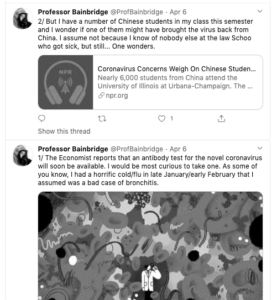 Figure 2: Tweet posted by Stephen Bainbridge on February 25, 2020
Figure 2: Tweet posted by Stephen Bainbridge on February 25, 2020
Figure 3: Tweet posted by Alton Wang in response to Stephen Bainbridge’s April 6 Tweets
Figure 4: Tweet posted by Alton Wang in response to Stephen Bainbridge
blocking him on April 10, 2020
Figure 5: Tweets posted by Stephen Bainbridge on April 10, 2020
and midnight on April 11, 2020
Figure 6: Email that Stephen Bainbridge sent to Constance Chan,
Brendan Pratt, and Alton Wang on April 10, 2020
Figure 7: Tweet that Reappropriate posted in response to Stephen Bainbridge
Figure 8: Tweet that Stephen Bainbridge posted in response
to Dean Mnookin’s statement regarding the Kavanaugh hearings
Figure 9: A flowchart that depicts the scenarios in which it is ok to say the N-word (only if you’re Black or mixed with Black), distributed by the Black Law Students Association in response to Eugene Volokh. (Note the cell that reads, “Not even if you are a law professor”) (emphasis in original).
Organization Signatures
UCLA Law Organizations
American Constitution Society
Armenian Law Students Association
Black Law Student Association
Criminal Justice Society
Disability Law Journal
Dukeminier Awards Journal of Sexual Orientation and Gender Identity
El Centro Labor and Economic Justice Clinic
Environmental Law Society
First-Generation Law Students Association
If/When/How: Law Students for Reproductive Justice
Indigenous Peoples’ Journal of Law, Culture and Resistance
International Human Rights Law Association
International Refugee Assistance Project Executive Board
Latinx Law Students Association
Law Students for Immigrant Justice
Muslim Law Students Association
Native American Law Students Association
National Lawyers Guild–UCLA
Older Wiser Law Students Executive Board
OUTLaw
Pacific Basin Law Journal
South Asian Law Students Association
Survivors & Allies Network
UCLA Law Review Executive Board
UCLA Student Bar Association
UCLA SBA Diversity Action Committee
Voting Rights and Political Law Society
Women of Color Collective
Women’s Law Journal
Non-UCLA Law Organizations
UCLA Asian Pacific American Medical Student Association
Chicago-Kent College of Law China Law Society
Student Signatures
This letter garnered 525 individual signatures, which we have removed to respect the privacy of the students.
Additional Thoughts
We allowed students to write about their experiences with xenophobia in this section, with the option to do so anonymously. These additional comments do not reflect the views of coauthoring organizations APILSA, APALJ, ISPS, and QTPOCC. We just wanted to let students bring their unique perspectives to the table, and for each student to have more of an impact than a simple signature.
Ryann Garcia, 2L:
During my 1L Orientation, I was made to sit through a “Diversity and Inclusivity” talk where students were forced to confront their biases. UCLA Law thought that a good way to do this was to then have us sit through a lunch (with what would be our LRW sections for the entire year—people we would have to sit and be “civil” with as we were forced to defend police brutality and racial stereotypes) and explain how we would show our “support” and be an “ally” to a hypothetical student that was being “bullied” for being a Trump supporter. Just the following month the school atrociously mishandled student concerns about the Kavanaugh hearings in addition to all of the insensitive tweets made by our own faculty. The next month, Dean Mnookin hosted a “town hall,” where we were allowed to voice our concerns (yet even there, Dean Mnookin refused to answer student questions or take accountability for her lack of support). As a 1L, I was incredibly hesitant to speak in front of the attending student body, faculty, and staff, and yet I was enraged about my law school experience after not even two months. I voiced my issues with how Orientation was handled and additionally asked why I was made to walk around school where a professor like Stephen Bainbridge openly celebrated and glorified the rape of my ancestors and my people (I referenced the tweets below). Of course, no recourse was taken, and every day I remember that this administration does not care about its students of color beyond the fact that we are diversity tokens to them. The amount of time that I and others, like the authors of this letter, have spent since we stepped foot on this campus trying to build community in the face of an unsupportive institution has taken its toll on all of us. Additionally, knowing that my and other Native and Indigenous students’ tuition (which we will all have to pay interest on, given the fact that this school doesn’t favor funding us to be here) is spent on the paycheck of a man who celebrates the genocide of our peoples has been an incredibly violent experience. This school would rather protect a man who is openly racist than actually support its students that it loves to slap photos of on social media and pamphlets. I urge the administration to do better. Please stop performatively reciting land acknowledgements if you aren’t going to actually help and support the Native and Indigenous students at your institutions. I can only try to comprehend and sympathize with the AAPI community that is now facing violence at the hand of this very professor in addition to the toll that the current pandemic has taken. I know firsthand how violent even a few tweets are, but I also know that this administration’s silence has made it loud and clear that they will continue to support a faculty member because they are bound by the outdated and colonial concept of tenure.
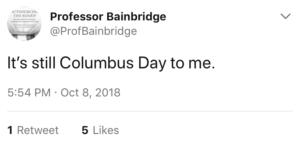
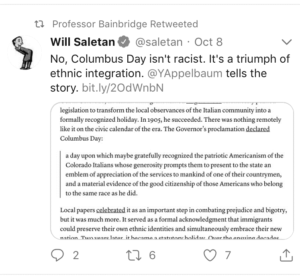
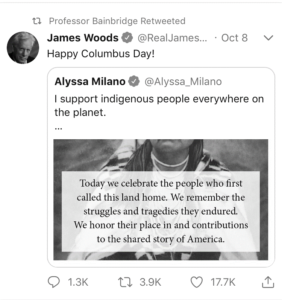 IPD post" width="282" height="300" />
IPD post" width="282" height="300" />
Leslie Joya, 2L:
During my 1L spring, I was ecstatic to take a Modes course with Professor Hiroshi Motomura and several classmates who I know were also interested in going into immigrant rights work. That excitement quickly turned to disappointment as we spent most of the semester having our conversations on policy strategy derailed by a classmate with extreme anti-immigrant views. Instead of learning from a leader in the field I want to go into, I had to explain to a classmate why using the word illegal is dehumanizing, and why ‘they should just come here legally’ is a gross oversimplification and misunderstanding of the racist history of U.S. immigration law. I also had to hear a lot of hurtful comments I’ve heard directed at myself and my family my entire life, such as: comments about ‘invasion,’ about people from Latin America being undesirable immigrants because they have abysmal levels of education, and about how it’s unfair that undocumented students have ‘hacked and cheated’ their way onto this very campus. His emphasis on how undesirable Latin American migrants and asylum seekers are, and how European immigrants simply assimilate better into the United States because they share “our” values and customs, made it impossible to believe that he was, as he said, not racist and merely upholding immigration law. I left feeling robbed of a seminar, as though I had to teach more than I learned, to someone who had no intention of genuinely hearing me out. If the University is going to honestly stand by its undocumented students and post “Dreamers Welcome” stickers at its student affairs windows, there should be more affirmative support and clear indication that such antagonism and hostility towards immigrants (especially when it’s directed at people of color) is unacceptable in the campus community.
I would also recommend reconsidering Professor Bainbridge’s membership on search committees if he is not committed to diversity in faculty, and sees the School’s emphasis on it as ‘indoctrination’ instead of a valuable asset to our community.[32] A conversation about the conservative lean of the legal profession as a whole may also be helpful. To give some perspective: every School of Law in the country requires students to think from the perspective of the intent of the founders (conservative men who could not conceive of many of our classmates having equal rights) but only one school has a Critical Race Studies program. Framing conservative views as ‘intellectual diversity,’ on equal footing and urgency as diversity initiatives based on race, gender, etc. is a false equivalency. This is especially true when certain conservative views, such as being against affirmative action, are in direct opposition to creating and supporting a diverse student body and faculty.
Roop:
This is a great letter. I would just like to add the possibility of providing support to students whose communities/families and who themselves are experiencing the effects of xenophobia beyond a one-time community forum. Perhaps the school could pay for a therapist to do support groups with Asian students, or students could be given funding to run such groups themselves. When a member of the Bay Area Sikh community and a family friend of mine was killed in second semester of my 2L year, I really struggled in school. This was compounded by the fact that the mosque attack in New Zealand had just occurred and I wasn’t able to go to my place of worship (an LA Sikh temple) without seeing police there. I believe they were there just in case an attack were to occur. I believe a lot of Asian Americans will be experiencing extreme anxiety and trauma just venturing out into the world right now and will be seeing and experiencing violence against their communities and families. The school needs to expend concrete resources to deal with this and support students. Maybe this could be mental health support, or perhaps it could be something else. But I think it needs to be a long term solution. Having grown up with 9/11 having a huge impact on my life as a Sikh, I know how these violent moments will alter the experience of life in the United States for many Asian Americans for many years. The school needs to implement policies that last beyond this semester and into the coming years to assist Asian American students with the impact of anti-Asian racism.
Wanyi Zhu, LLM, China:
Freedom of speech is good. But the exercise of freedom must not hurt the rights of others. It is called negative liberty, a concept delivered by Isaiah Berlin in the lecture “Two Concept of Liberty.” Negative liberty means free from other’s harm, which has intrinsic value and instrumental value.
But what Stephen Bainbridge did contradicted the way we cherish our negative liberty. He attributed his assumed bronchitis (he cannot even confirm what it was) to Chinese students in his class. He didn’t consider American students who were sick or whose family got cold/flu recently (there was evidence that there were cases in the United States were misclassification of COVID-19 as flu months ago[33]; an Italian professor talked about he had seen patients last year had similar COVID-19 symptoms in Italy[34]; several French posted on social media that they had strange symptoms last year that were similar to COVID-19). He didn’t consider travel history and contact history as well. His logic was that COVID-19 spread in China à He got sick à It was due to Chinese students in his class. There are too many gaps in his reasoning. The idea he conveyed is inappropriate, disgusting, and should be abandoned.
—First, Stephen Bainbridge seems to think that bats, civets, and other wild animals may have some relations with the COVID-19, but no authorities have confirmed that up to now!
—Second, Stephen Bainbridge seems to think that a lot of Chinese eat bats, civets, and other wild animals, which is wrong. Just because there is someone in China who eats wild animals doesn’t mean other Chinese will eat it. For example, we see the homeless on the street in the United States, can we claim that Americans are homeless. It is called group attribution error.
—Third, COVID-19 first outbroke in China doesn’t necessarily mean its originality is in China.
—Last, whether Stephen Bainbridge said that because of his ignorance or malice, he should apologize to us who are offended by his speech.
Part of the reasons that led me to American legal study is that I heard America is a tolerant and diverse country where everyone pursues ideal life without being harassed by others. But what I was facing disappointed me. Nobody believed us in January and February when we talked about how severe COVID-19 was (they treated it as cold/flu). After we got frustrated that we cannot help others when others didn’t listen to us, we tried to protect ourselves by wearing masks. However, we were still being hated: people treated us not as the affected by viruses but the virus itself. Chinese students hesitated about wearing masks—If wearing masks, that would make us more likely to be attacked by racists; If we don’t wear masks, we are in danger of being infected. In March, the status in the United States became severe. Several U.S. politicians covered their inaction to COVID-19 by switching people’s attention, blaming the Chinese government for not telling them earlier about COVID-19. But the truth is that they knew it was a hard-beating virus before the U.S. officially closed the entry to mostly everyone but US citizens who have been to China during the last 14 days on February 2.[35] If it was cold/flu, why were they doing that? In a situation like now, the law school must play a role in the incident at least starting from dealing with Stephen Bainbridge’s inappropriate speech. Chinese students need support more than ever.
Ruihan Li, LLM, China:
I second many points Wanyi raised above. Professor Bainbridge even didn’t make efforts to confirm the accuracy of the facts that he alluded to in his tweets. And as a legal scholar, many of his reasoning are illogical. Just because he is a distinguished professor in US business law, doesn’t mean he is knowledgeable in other fields on matters in another country that he has so limited and biased information sources. I question Prof. Bainbridge’s academic competence and professional ethics. And I am deeply sympathetic for him not being aware of his ignorance and the fact that he is vulnerable to biased misinformation.
UCLA is one of the very few leading education institutions in the United States where Asian students are the largest population among all races (28 percent) in its undergrad program.[36] There are over 1200 Chinese students on UCLA campus. We are in LA, a city that has the second largest Asian community in the United States.[37] It is the mission of UCLA Law to train graduates who emerge as leaders ready to initiate and influence change, while being committed to equality of access and opportunity.[38] Sadly, we are still facing racism and hatred here, even worse, from faculty, even worse, a renowned tenure faculty.
We, Chinese students in UCLA Law are extremely cautious to comply with guidance that stops the spread of the virus, none of us are infected with COVID-19. In fact, none of the neighborhoods with large Chinese residents in LA has high cases.[39] Because Chinese community is all cautious. Prof.Bainbridge owes us Chinese students an apology directly.
If at UCLA Law, its renowned tenure professor can blatantly discriminate against Chinese students, harming the Asian community, and the law school doesn’t take potent actions to stop and condemn discrimination within itself, how can it train leaders to take on the responsibilities to advocate for equality and social justice elsewhere??? UCLA Law professionals should be the defenders for people who are harmed by discrimination, rather than the nidus itself. I hope UCLA Law and its faculty can realize their great responsibilities in this historical moment, at the outset of a greater Asian civil rights movement, amid a catastrophic disaster for all humankind.
As a law student from China, it is extremely painful for me to know that we are being specifically targeted by an authoritative scholar in our beloved law school.
Had many of our Chinese students known UCLA Law tolerates racist professors, we wouldn’t have come here to study in the first place. I hope UCLA Law handles this case seriously and responds to students’ grievance potently, otherwise, its international reputation will be permanently harmed. And if necessary, all Chinese students on UCLA campus can join us to initiate the change that deserves existence for a long time.
Racism is so new in my life, I am heartbroken to realize it came into my life in a place I came for intellectual nurture.
Yuri Han, JD/MPP:
I am a Korean American student. While racist comments are not unfamiliar to me, when it comes from a UCLA Law professor, I feel great disappointment and sorrow. I look to many UCLA Law professors as role models, especially during this chaotic time when many Asian Americans are experiencing heightened stress and hateful attacks. Even though I have now spent most of my life in the United States, I know that when some people see me, they see me as foreign, other, and now, even a threat. During this time, many in my community have experienced racially charged verbal assaults; some who are close to me have received death threats. Professor Bainbridge, your comments deeply hurt me because it makes me wonder if some UCLA Law professors also see me as someone deserving of such threats.
Shuping Dong, LL.M., China:
To Professor Bainbridge, “if we ask nicely, do you think we can get USA to ban discriminating black, yellow, and other non-white that serve as human races?”
Runci Li, LLM, China:
Before I came to UCLA, I heard how good this teacher’s lessons are and I have a good impression of him, until this racist thing happened. How ironic it is that even a college professor would deliver such inappropriate statements, framing his students up. We respect every professor, but now we get so slandered by him. It seems like the freedom of speech is getting wilder and wilder and bears little limitation. This man based his racist statements on groundless suspicion to Chinese students, and published them on social media. This is a hard time for America, and the whole world. The government needs to focus on controlling the disease, but certain people such as this man are fanning the flames, invoking racial discrimination. Chinese students are easily discriminated against. Now they may use this disease as a reason, which makes our living situation even worse. School should be responsible for controlling the spread of racism. This man’s behavior deserves a stern warning, also, deleting any inappropriate words. He owes us an apology!
Yichen Luo, LLM, China:
Thanks for drafting this petition. I respect the setting of tenure which can provide more freedom to respected professors. However, it can be bad by protecting a professor’s irresponsible statement regardless of others feelings. Moreover, even ironically, Bainbridge’s statement made all those Chinese students who selected his course as targets for suspicion. What a great byproduct of his courses, the risk of being suspected and discriminated against. And all these discrimination are solely based on Bainbridge’s own imagination and so called “wonders”. Truly hope law school can show this kind of risk to all new students when offering course-selecting guidance in the future.
Siman Chen, LL.M., China:
I remember the first day of Orientation Week last year, law school organized LL.M. students to have a picnic on campus together so that students were able to know more about each other. While having lunch, a girl asked me “Do people in Hong Kong hate Chinese people?” Before I explained, another girl answered: “I think so. My Hong Kong friends told me that they hate Chinese.” I was hurt because it seemed like they thought it was ok to hate people from certain countries and they didn’t care about my feelings. It was just the first day of school and I did not do anything wrong but I was offended just because of my nationality!
I think law school should tell students the importance of respecting diversity and people. Diversity not only includes different race, gender but also includes different political systems and cultures. UCLA used to have a good reputation regarding diversity among Chinese students. But now I am suspicious about this because of some professors’ speech and some students’ behaviors.
Poren Chiang, LL.M. 2020, Taiwan:
Xenophobia and broad demonification of ethnic groups are nowhere near acceptable in a modern society. A respected academic professional like Professor Bainbridge should’ve known the harm and the mistrust he could’ve caused, if not already, and our faculties do need to consider possible options of peer discipline.
As to remedial actions, however, I respectfully disagree with the calls proposed by my fellow friends in APLASA. Neither monetary donation nor participating forums could magically shift one’s values. Flooding the Dean’s inbox is more of an emotional outlet than rational pressuring.
This doesn’t mean we should overlook the emotional burden or wounds worsened by Professor Bainbridge’s hostile comments, nor should we stop supporting each other in the devastating time of an epidemic. We call ourselves the UCLA Law Community, but we still rely on student reps and the Deans to look after our concerns; courtyard events were more festive than participatory, and the disconnection between student ethnic groups and faculties are still apparent. If anything needs to be done from the height of Law School, it would be the reconstruction of our community: get to know each other personally, respect the presence of individuals from diverse origins, and learn how to be a decent citizen, a decent friend, and a decent human being. Forums and assuring letters wouldn’t help us in the long term.
I understand how hurtful my Chinese classmates would be when they are suffering only because of their origin. I was detained for hours in Sri Lankan airport, almost denied boarding at the gate, humiliated by the UN Police, belittled, misnamed and misidentified (sometimes without ill intention) all because of my Taiwanese nationality. As doubtful as I could be towards the Chinese government, none of our classmates should be accused of carrying disease. Broad generalization and colonial jokes are neither cultured nor humorous; disparity on the political spectrum does not justify personal attack to ethnic groups. No one deserves to be treated like this.
As for the student body, it might be hard to change Professor Bainbridge’s mind, but it’s still not too late for us to bond and demonstrate the fact that their views do not represent us. In stressful times, while continuing to condemn the distressing expression, please don’t let the awareness settle after a few politically correct public letters and events.
Anonymous:
It is Easter—Catholic churches throughout the world have suspended public Mass, not due to lack of faith but through an abundance of love for those who are most vulnerable. It is truly sorrowful that this year’s Holy Week, having already endured a time of plague and crisis, has been marred with actions that have caused deep wounds within our API community.
The hurt that Professor Bainbridge’s tweets have caused is deep, adding scars onto generational trauma and contemporary xenophobia. In these times, many of us are struggling, not only with the pandemic but also with the ensuing racial threats and violence. We must denounce injustice, however absentminded, and stand with those who are suffering. We must hold in solidarity “a commitment to the good of one’s neighbor with the readiness, in the gospel sense, to “lose oneself” for the sake of the other instead of exploiting him” (Pope John Paul II, Sollicitudo Rei Socialis (30 December 1987)). Especially now, we must think of ourselves less and instead think of each other and protect each other from physical, emotional, and spiritual hurt.
We know that it is not through loudly performing prayers in the corners of streets, but through reaching out to those in suffering and those most in need that we are able to act as Christ has instructed us. After all, did Christ not teach us to love our neighbor as ourselves? Did the Bible not tell us to show hospitality to strangers, lest they be angels in disguise? We have no neighbor but anyone who is in need, and our duty is to join together to help them, not amplify their suffering.
Professor Bainbridge, Easter is a time to reflect upon our sins and on the promise of new life. Please make amends to the community in which we all must stand together.
[1]. Stephen Bainbridge (@ProfBainbridge), Twitter, [https://perma.cc/GL4F-AMMZ] (Feb. 25, 2020).
[2]. The original tweet links to an NPR Morning Edition Episode, which actually discusses the racism that Chinese students are experiencing due to COVID. See Coronavirus Concerns Weigh On Chinese Students At U.S. Colleges,
NPR (Feb. 6, 2020) (noting that racially insensitive comments “have led to a sense of ill-ease among some Chinese students here and that’s amplified by social media back home”).
[3]. Alton Wang (@altonwang), Twitter, [https://perma.cc/HY6L-UHAG] (Apr. 10, 2020).
[4]. Included below as Figure 4. [https://perma.cc/R5MS-ZNBS] (Apr. 10, 2020).
[5]. Included below as Figure 7. “What was your intent with these tweets, if not to perpetuate harmful stereotyping that exacerbates the negative racial climate currently faced by Asian Americans and in particular antagonizes your Asian American students?” [https://perma.cc/S7DX-R8CT] (Apr. 10, 2020).
[6]. Stephen Bainbridge (@ProfBainbridge), Twitter, [https://perma.cc/85MT-39YE] (Apr. 11, 2020).
[7]. Included below as Figure 5.
[8]. Included below as Figure 6.
[9]. If a concerned student were to check his profile again after reading the initial Tweets, the only development that would be apparent is the fact that he has since deleted the Tweets and has now posted a joke concerning COVID and Lent. It is important to note that this joke was posted within the same hour as his apology reply to Alton. [https://perma.cc/PVF6-8APD].
[10]. See Faculty Code of Conduct, UCLA General Catalog 2019–2020.
[11]. See email sent by Student Announcements (studentannouncements@law.ucla.edu), subject line “Message from the Asian Pacific Islander Law Students Association: Open Letter re: Xenophobia”, dated March 30, 2020. https://twitter.com/apilsa/status/1249381021453144064.
[12]. Just a few days ago in a racially motivated crime, a person threw acid at an Asian woman in Brooklyn. See Tina Moore, Brooklyn Woman Burned Outside Home in Possible Acid Attack An Asian Family, N.Y. Post (Apr. 6, 2020). An Asian family, including a two- and six-year-old, were stabbed last month as part of a hate crime. See Sara Boboltz, Stabbing Of Asian American Toddler And Family Deemed A Hate Crime: Report, Huff. Post (Apr. 1, 2020) (noting that the suspect admitted to police that “he stabbed the family because he thought the family was Chinese and infecting people with the coronavirus”). A recent Facebook video shows an Asian-American family in Los Angeles being verbally assaulted by a stranger on a walk through their neighborhood. The post’s author reported that “[The stranger] proceeded to throw racist obscenities towards me and my family. Before my wife had a chance to start filming, he told us to ‘go back to China with the coronavirus’ and to ‘shut up and go eat some rice.’” Sam Han, Facebook (Apr. 7, 2020) [https://perma.cc/V6SY-KMJE]. The National Council of Asian Pacific Americans, along with over 260 other organizations, have called on Congress to denounce these attacks.
[13]. Woman Records Racist Coronavirus Rant While on Subway, CNN (Feb. 21, 2020), https://www.cnn.com/videos/us/2020/02/21/coronavirus-attack-recording-la-train-jiraprapasuke-acfc-sot-vpx.cnn. Sabrina Tavernise and Richard A. Oppel Jr., Spit On, Yelled At, Attacked: Chinese-Americans Fear for Their Safety, N.Y. Times (Mar. 23, 2020), https://www.nytimes.com/2020/03/23/us/chinese-coronavirus-racist-attacks.html?fbclid= IwAR1EguheLNlSPV_Yb3wquDhpGEI8Mum4T2s1XdFS6hblBxqDbrQXAeMdNrI. Anna Russell, The Rise of Coronavirus Hate Crimes, New Yorker (Mar. 17, 2020), https://www.newyorker.com/news/letter-from-the-uk/the-rise-of-coronavirus-hate-crimes (recounting the story of Jonathan Mok, who was kicked and punched in the face in London by a man who said, ‘I don’t want your coronavirus in my country.”). Kristine Phillips, “They Look at Me and Think I’m Some Kind of Virus”: What It’s Like to be Asian During the Coronavirus Pandemic, USA Today (Mar. 28, 2020), https://www.usatoday.com/ story/news/nation/2020/03/28/coronavirus-racism-asian-americans-report-fear-harassment-violence/2903745001 (“The incidents involved not only Chinese Americans, but also Japanese, Koreans, Taiwanese, Vietnamese and Filipinos—a clear case of racial profiling against Asian Americans . . . . Some said they were barred from business establishments, yelled at by cashiers and customers who accused them of bringing the virus to the country. Some said Lyft and Uber drivers refused to give them rides.”).
[14]. Asian Pacific Policy and Planning Council, Press Release: Stop AAPI Hate Receives Over 1,100 Incident Reports of Verbal Harassment, Shunning and Physical Assault in Two Weeks (Apr. 3, 2020), http://www.asianpacificpolicyandplanningcouncil.org/wp-content/uploads/ Press_Release_4_3_20.pdf.
[15]. Numerous recent studies have in fact indicated that New York City’s outbreak came from European visitors and the U.S. government’s failure to instate even minimal health screening in its airports. See Carl Zimmer, Most New York Coronavirus Cases Came From Europe, Genomes Show, NYTimes (Apr. 8, 2020). See also Madeline Holcombe, New York’s Coronavirus Outbreak Came From Europe And Other Parts of the United States, Research Projects Suggest, CNN (updated Apr. 9, 2020). The United States now leads the world in highest COVID-19 cases and deaths by a far margin, which many experts have stated is a result of the U.S. government’s slow pandemic response, failure to adequately equip its hospitals, failure to instate adequate quarantines and travel restrictions, and lack of universal healthcare. See Donald McNeil, The U.S. Now Leads the World in Confirmed Coronavirus Cases, N. Y. Times (Mar. 26, 2020). However, the continued blame on China, as exemplified by Professor Bainbridge’s tweets, indicates a lack of understanding of the United States’ own failures in its pandemic response.
[16]. See UCLA Law’s Commitment to Diversity and Inclusion, available at https://law.ucla.edu/student-life/diversity (“Diversity and inclusion are fundamental to our role as a leading public law school in one of the most diverse cities in the world. Some of our specific goals include creating a more inclusive law school community; engaging in critical discourse about legal and social issues within the law which are often avoided or suppressed; developing professional identity; and enhancing cultural sensibility to equip students with the tools necessary to effectively practice in an increasingly diverse world”) (emphasis added).
[17]. Cf. Dean Mnookin’s email sent in response to COVID, dated February 28, 2020 (“I am acutely mindful of the numerous members of our community who are from areas where many are infected, as well as those who have family and friends significantly impacted by the virus . . . . Misinformation and misguided precautions, often rooted in racially insensitive stereotypes, have already proliferated across the world; let us please assure that in our community, we do not stigmatize anyone in our campus or greater community based on national origin”) (emphasis added).
[18]. UCLA Law’s LLM information page advertises, “UCLA Law’s faculty has a world-class reputation for scholarship. We’re unique, however, because these leading scholars also seek to foster an encouraging and supportive learning environment.” See https://law.ucla.edu/llm-sjd/llm-program. See also Cheryl Harris, Critical Race Studies: An Introduction, 49 UCLA L. Rev. 1215, 1234 (2002) (“[L]iberal and conservative paradigms about race infuse the curriculum at every level and determine a wide range of pedagogical decisions regarding, among other questions, text, cases taught, issues raised, and the framing of parameters in classroom discussion.”). But cf. American Enterprise Institute, UCLA Law Professor Stephen Bainbridge’s Diversity Statement (Jan. 1, 2020).
[19]. This student’s privacy has not been violated without permission. This student came forward and willingly shared their experience at the DSAC meeting and approved inclusion of this message.
[20]. See Keith Aoki, Language is a Virus, 53 U. Miami L. Rev. 961, 962 (1999) (“Like a virus, language is a nonliving pattern of information, a configuration of meaning that attaches itself to consciousness, a program waiting to be executed, changing both the consciousness it infects and morphing its very own structure as it replicates itself.”).
[21]. See Shenck v. United States, 249 U.S. 47, 52 (1919).
[22]. See Korematsu v. United States, 323 U.S. 214 (1944).
[23]. See NAPABA, Press Release: Stand Against Hate. See also NCAPA, Press Release: Asian American and Pacific Islander Leaders and Over 260 Civil Rights Organizations Call on Congress to Denounce Anti-Asian Racism around COVID-19 (Mar. 11, 2020).
[24]. See Ivan Natividad, Coronavirus: Fear of Asians Rooted in Long American History of Prejudicial Policies, Berkeley News (Feb. 12, 2020). See John Kuo Wei Tchen & Dylan Yeats, Yellow Peril: 19th-Century Scapegoating (Mar. 5, 2014) (“Depicting Chinese immigrants as potential threats to national security in the 1880s secured Congress’s exclusive Constitutional right to regulate immigration as a function of its war powers, internal and external.”).
[25]. During the Kavanaugh hearings, Dean Mnookin recognized that the student body had been under “tremendous strain” because of a “painful . . . spectacle” that was “deeply re-traumatizing.” See Dean Mnookin’s email in response to the Kavanaugh hearings, dated October 4, 2018. Around that time, Stephen Bainbridge issued the following Tweet: “My dean sent around an email asking faculty to be considerate of students stressed by the Kavanaugh hearings. I asked in reply: When do we teach our students that they are going to be professionals who will often have to set aside their personal feelings and get on with the job?” (emphasis added). Cf. the first response that UCLA Law gave to the Kavanaugh hearings, in the form of this Tweet: “Should #Kavanaugh sue for libel over new assault allegations? @VolokhC tells @lawcrimenews: ‘It’s rarely in the interest of office holders to sue for libel, legal standard to prove defamation is high & lawsuit will keep the allegation in the public eye.’” Compare with the letter sent by the Survivors and Allies Support Network, dated September 18, 2019 (“As a leading law school, UCLA School of Law has a duty to take these allegations seriously and use its voice and resources to support survivors. Instead, by issuing this Tweet, the Law School politicized the stories of survivors and gave credibility to the individuals who attempt to discredit survivors”). See also Student Groups Protest UCLA Law Professor Stephen Bainbridge’s Heated Blog Remarks, Law School Dean’s Written Response, The Daily Bruin (Apr. 15, 2011) (“The post, made by Stephen Bainbridge, professor of corporate law, began with complaints about FedEx Express Office online services. Bainbridge described the customer service representative he spoke with as a ‘moron with an impenetrable accent,’ and asked, ‘What third world shithole do they have him penned up in?’”) (emphasis added).
[26]. See the flowchart released by the Black Law Students Association (included as Figure 9 below).
[27]. At the time of this writing, the UCLA Law Faculty Code of Conduct does not describe or enforce any policy regarding faculty social media behavior beyond this language: “When they act or speak in their personal and private capacities, they should avoid deliberately creating the impression that they represent the University.” See UCLA Assembly of the Academic Senate, The Faculty Code of Conduct 9 (2017) (emphasis added). Professor Bainbridge, in his public Twitter account, acknowledges that his views do not reflect the law school’s views in a disclaimer: “Views my own.” Stephen Bainbridge (@ProfBainbridge), Twitter, [https://perma.cc/GL4F-AMMZ] (Feb. 25, 2020).
[28]. We understand that UCLA Law is created with a certain division of power between the deanship and the faculty, but we ask that this structure not be used as an excuse to evade accountability.
[29]. See Dean Mnookin’s email sent in response to COVID, supra note 17. To our student readers, we see you and hear you: We understand that it is disingenuous for the school to expect us to see our professors as intellectual and professional giants, and also to expect us to disregard the opinions they espouse beyond the four corners of the casebook. We also understand that it is disingenuous for the school to tout its students’ unique and diverse perspectives, and then to ignore their concerns about ongoing racism from inside and outside UCLA Law. We also agree that it is disingenuous to ask us to engage in current events, and then to expect us to turn away when our community is threatened.
[30]. Compare with Dean Mnookin’s email in response to the Kavanaugh hearings, supra note 25 (addressing the campus discourse regarding the hearings with a quote from Measure for Measure).
[31]. William Shakespeare, Julius Caesar, Act IV, Scene 3 (Folger Library, Simon & Schuster) (2004).
[32]. See American Enterprise Institute, UCLA Law Professor Stephen Bainbridge’s Diversity Statement (Jan. 1, 2020).
[33]. https://www.globalresearch.ca/us-cdc-director-admitted-virus-deaths-miscategorized-flu/5706233.
[34]. https://automobilnews.eu/italian-professor-repeats-warning-coronavirus-may-have-spread-outside-china-last-year-news-by-automobilnews-eu.
[35]. https://www.whitehouse.gov/presidential-actions/proclamation-suspension-entry-immigrants-nonimmigrants-persons-pose-risk-transmitting-2019-novel-coronavirus.
[36]. http://www.admission.ucla.edu/campusprofile.htm.
[37]. https://www.census.gov/prod/cen2010/briefs/c2010br-11.pdf.
[38]. https://law.ucla.edu/the-ucla-law-difference/training-leaders.
[39]. https://www.latimes.com/projects/california-coronavirus-cases-tracking-outbreak.
[pdf-embedder url="https://www.uclalawreview.org/wp-content/uploads/securepdfs/2020/08/Vol68-APILSA-Letter.pdf" title="Vol68-APILSA Letter"]
